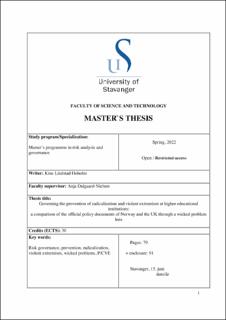Governing the prevention of radicalization and violent extremism at higher educational institutions: A comparison of the official policy documents of Norway and the UK through a wicked problem lens
Master thesis
Permanent lenke
https://hdl.handle.net/11250/3014182Utgivelsesdato
2022Metadata
Vis full innførselSamlinger
- Studentoppgaver (TN-ISØP) [1428]
Sammendrag
The increasing attention accorded to radicalization and violent extremism (RVE) has resultedin higher educational institutions finding themselves at the forefront of counterterrorismstrategies. In recent years, both Norway and the UK have implemented official policiestargeting the prevention of RVE in this sector. However, implementing policies on theprevention of RVE is not problem-free. It is often viewed as a tantamount to a wicked policyproblem as there exist high degrees of knowledge gaps, conflicting values and interests, andvarious stakeholders with differing priorities and tasks. This challenge is also reflected in thetwo policies. Despite similar aims, their reception varied substantially as the UK policy hasbeen subject to considerable criticism on its potential to endanger educational functions andsocietal freedoms. This thesis compares and examines the two policies to extract knowledge ontheir functioning and to explore why they were met with such differing receptions.
The policies´ are examined and compared regarding their risk governance strategy and througha theoretical framework building on wicked problems and governance theory. As theeffectiveness of prevention concerning its possibilities to reduce RVE is inevitably unknown,the processes and management aspects of the policies illuminate knowledge on theirfunctioning and implications on P/CVE in higher educational institutions. Three key principlesfor governing wicked problems are thus identified to frame a comparative document analysis.
The findings in this research point to similarities and vital differences regarding the riskgovernance strategies identified within the two countries´ official policy documents. Thesedifferences also result in them aligning with insights on governing wicked problems to variousdegrees. The Norwegian strategy is found to align with research to a high degree, while, theUK policy seems to only reflect research to some degree. Findings also showed that this resultsin the Norwegian policy offering better pre-requisites for approaching P/CVE at highereducational institutions. The findings also point to the identified differences in the strategiesrepresenting a plausible, partial explanation for the criticism targeted towards the UK policy.Consequently, the findings suggest an ought awareness on risk governance strategies as theyare not insignificant for how the P/CVE at higher educational institutions unfolds.Simultaneously, more situational research is called for to acquire a broader and a more holisticpicture of the policies and their belonging practices.
